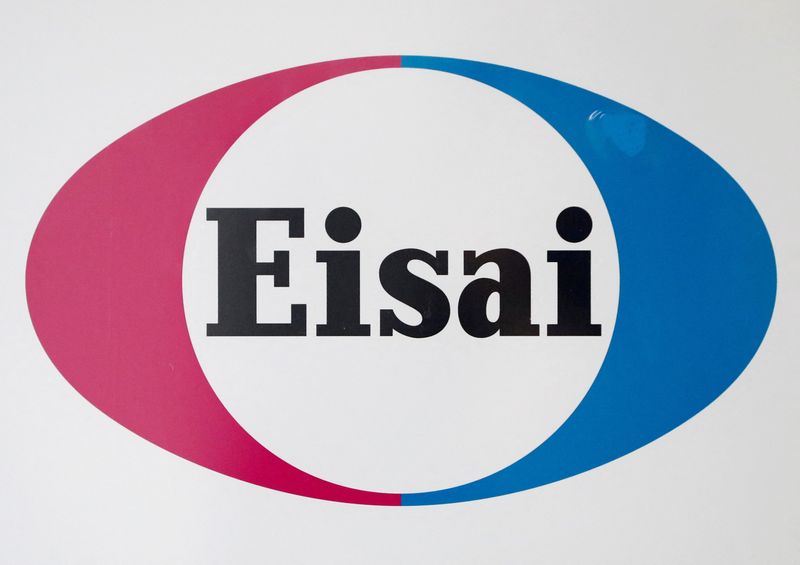By Deena Beasley
SAN FRANCISCO (Reuters) -An experimental Alzheimer's drug from Eisai and Biogen (NASDAQ:BIIB) slowed cognitive decline in a closely watched trial but may carry a risk of serious side effects for certain patients, according to detailed data presented on Tuesday.
The drug, lecanemab, was associated with a dangerous type of brain swelling in nearly 13% of patients in the trial that spanned 18 months and enrolled nearly 1,800 participants with early-stage Alzheimer's.
Some patients also experienced bleeding in the brain, with five suffering macrohemorrhages and 14% suffering microhemorrhages - a symptom linked to two deaths of people receiving the drug in a follow-on study.
The companies said in September that lecanemab - an antibody designed to remove sticky deposits of a protein called amyloid beta - reduced the rate of cognitive decline on a clinical dementia scale (CDR-SB) by 27% compared to a placebo.
"All of these amyloid-lowering drugs carry a risk for increased brain hemorrhage," said Dr. Ronald Petersen of the Mayo Clinic in Rochester, Minnesota. "I think the primary outcomes, the secondary outcomes, the amyloid-lowering is pretty impressive."
The Alzheimer's Association said the data confirms the drug "can meaningfully change the course of the disease," and called on U.S. regulators to approve the company's application for accelerated approval.
Eisai shares climbed 3.6% in Tokyo afternoon trade while Biogen shares were 0.9% higher in after-hours trade. They have jumped some 60% and 47% respectively since the announcement of the trial's initial findings in late September.
The full data showed that some patients with a genetic risk of developing the mind-wasting disease did not benefit from lecanemab based on the CDR-SB measure.
They did, however, show improvement for the trial's secondary goals, including other measures of cognition and daily function. Overall, lecanemab patients benefited by 23% to 37% compared with a placebo on these secondary trial goals
"I believe it's an important benefit that will justify full approval. But of course, we want a bigger benefit," said Dr. Paul Aisen, director of the University of Southern California Alzheimer’s Therapeutic Research Institute and a co-author of the study published in the New England Journal of Medicine.
He said lecanemab is likely to provide greater benefit if given earlier in the disease, "before you've accumulated enough irreversible damage to be causing symptoms."
Detailed data from the study were presented at the Clinical Trials on Alzheimer's Disease meeting in San Francisco.
PROOF OF AMYLOID THEORY
Eisai believes the trial results prove a longstanding theory that removing amyloid beta from the brains of people with early Alzheimer's can delay advance of the disease.
At 18 months, 68% of trial participants treated with lecanemab had amyloid clearance, Eisai said. The drug also lowered levels of tau, a different protein that forms toxic tangles inside brain cells.
The two deaths from brain hemorrhages that were reported in the follow-on study were a 65-year-old woman who received a type of medicine known as tissue plasminogen activator to clear blood clots after suffering a stroke and an 87-year-old who was on the blood thinner Eliquis.
Eisai said it believes the deaths "cannot be attributed to lecanemab."
The company has protocols in place for monitoring brain swelling and sees no need for restrictions on which patients might be eligible for lecanemab, Ivan Cheung, Eisai's U.S. chairman, told Reuters in an interview.
Dr. Howard Fillit, chief science officer at the Alzheimer’s Drug Discovery (NASDAQ:WBD) Foundation, said doctors always balance the benefits and risks of therapies. "Currently, I would hesitate to give this drug to someone on blood thinners," he said.

The U.S. Food and Drug Administration is slated to decide by Jan. 6 whether to approve lecanemab under its "accelerated" review program, which requires proof that a drug can impact a biomarker associated with a disease, such as reduction of amyloid beta in the brain.
Regardless of that decision, Cheung said Eisai plans to soon file for standard FDA approval of the drug and will also seek approval in Europe and Japan.
